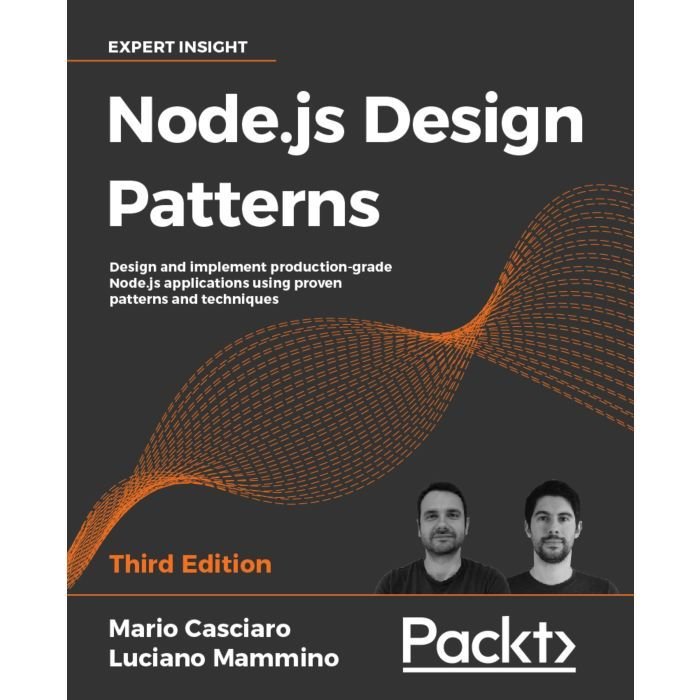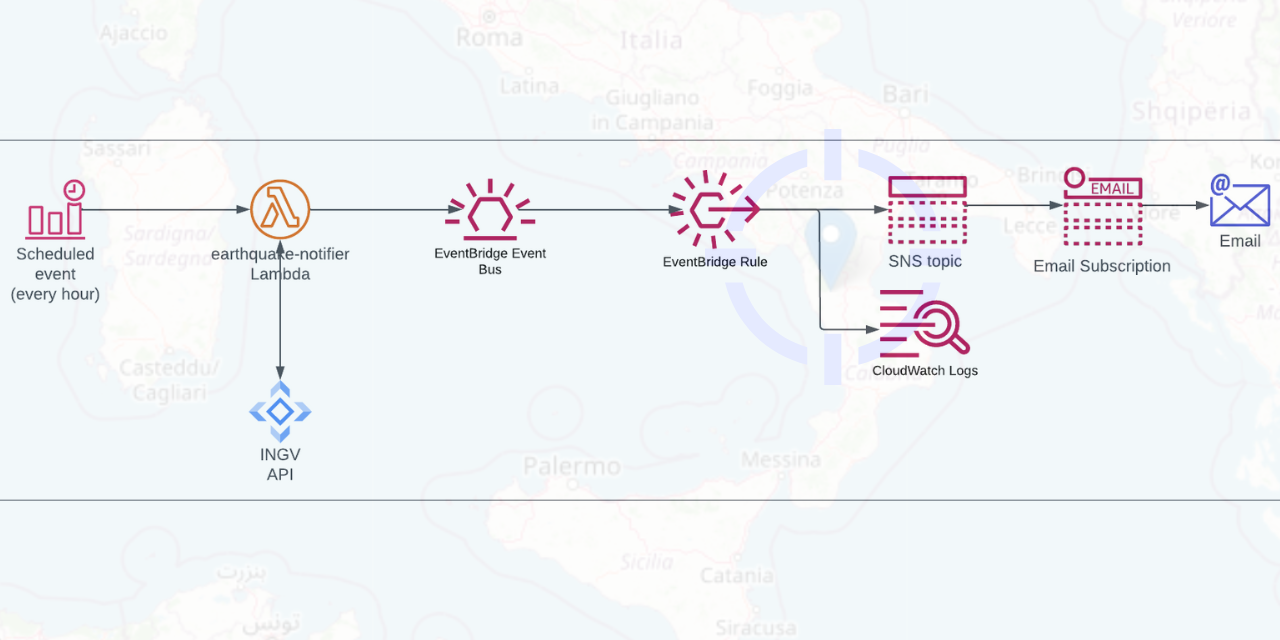Optimized Lambda functions
with Rust (Workshop) 🔨
Luciano Mammino (@loige)
2024-12-12



👋 I'm Luciano (🇮🇹🍕🍝🤌)
👨💻 Senior Architect @ fourTheorem
📔 Co-Author of Node.js Design Patterns 👉
Let's connect!



$ ~ whoami
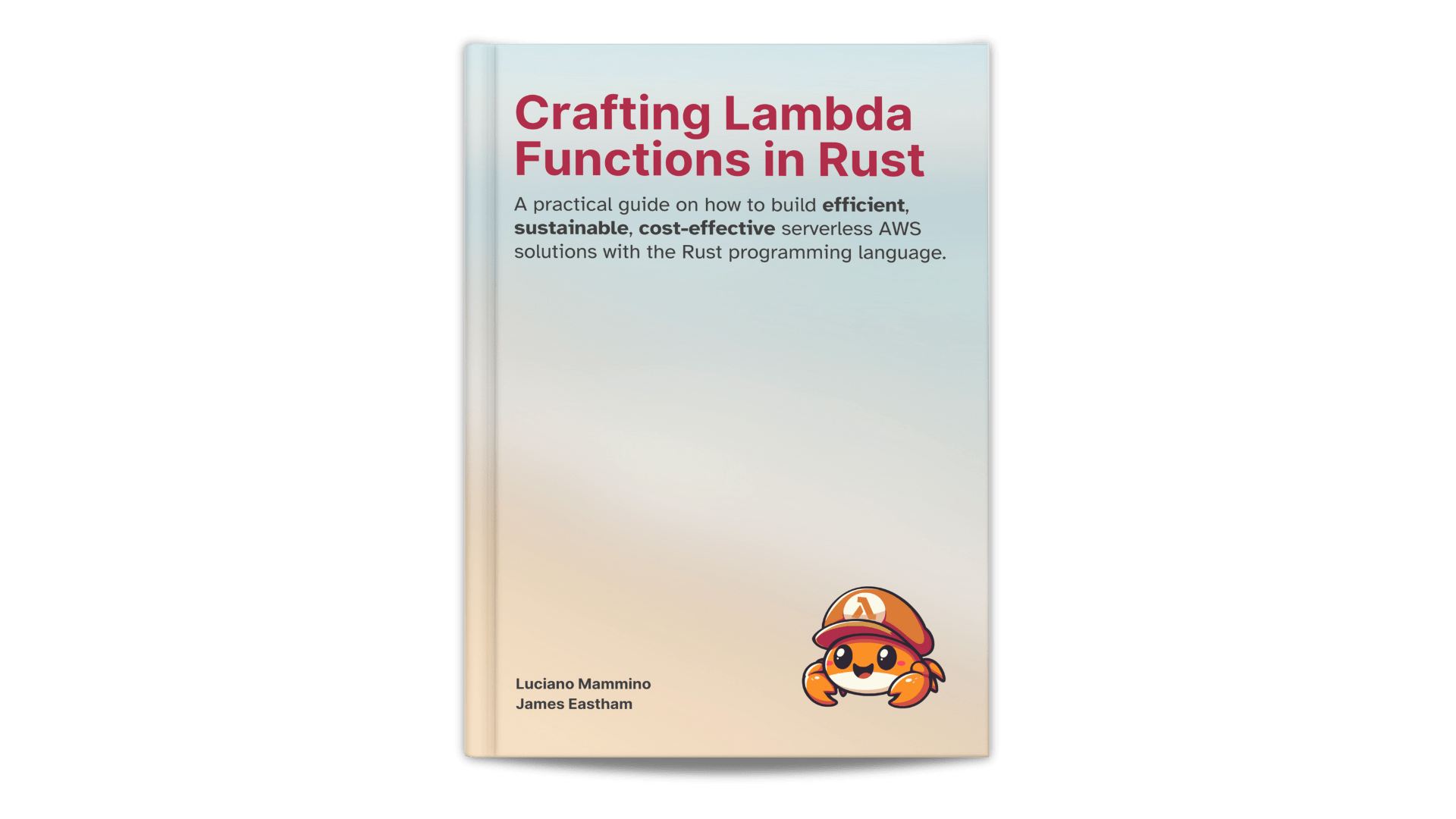
👋 I'm Luciano (🇮🇹🍕🍝🤌)
👨💻 Senior Architect @ fourTheorem
📔 Co-Author of Crafting Lambda Functions in Rust 👉
Let's connect!



$ ~ whoami

Early-access available at
40% discount! 🤑
Always re-imagining
We are a pioneering technology consultancy focused on AWS and serverless
✉️ Reach out to us at hello@fourTheorem.com
😇 We are always looking for talent: fth.link/careers
We can help with:
Cloud Migrations
Training & Cloud enablement
Building high-performance serverless applications
Cutting cloud costs


loige.co
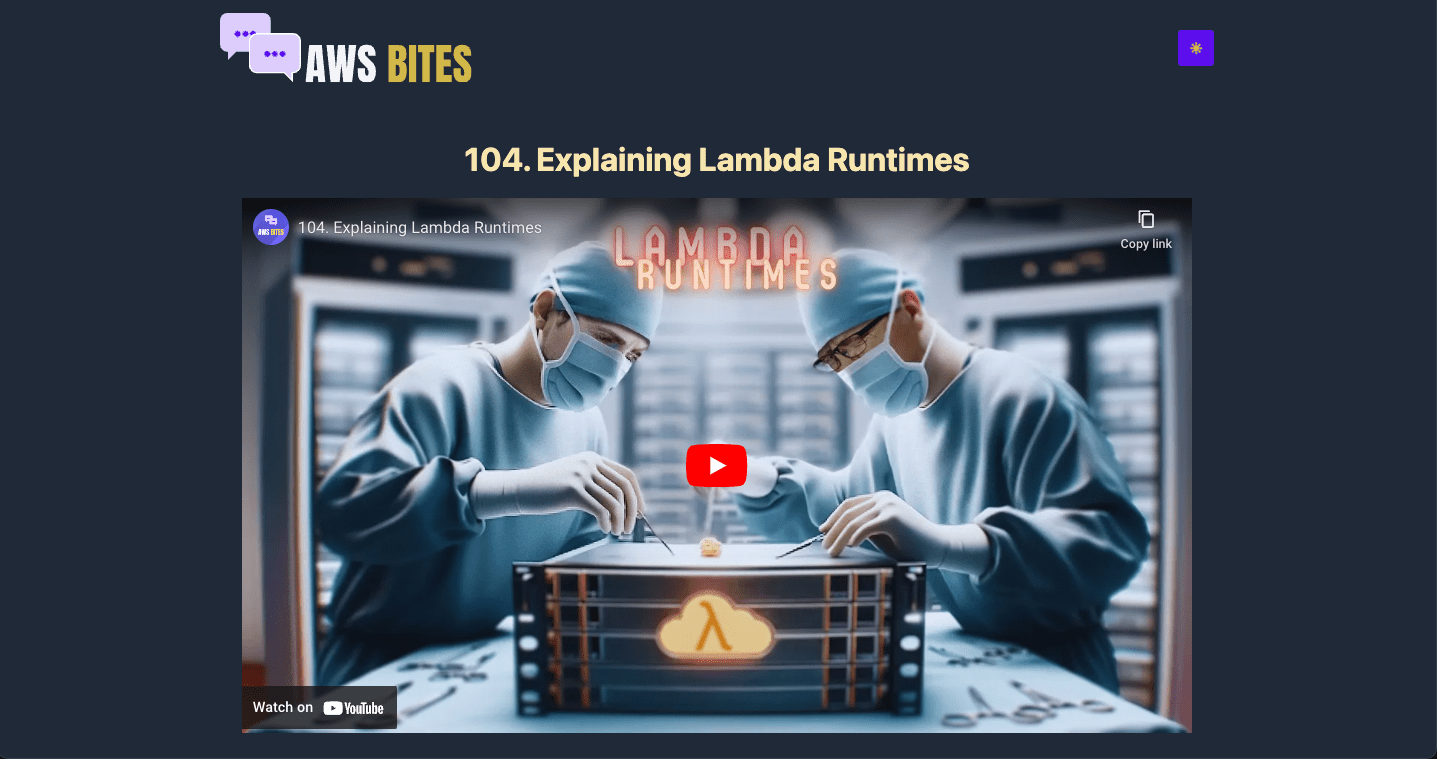
loige.co

loige.co
What is RUST?


loige.co
What is RUST?



loige.co
OK... Why do I like RUST?



loige.co
Why do I like Rust? ❤️
-
Zero-cost abstractions
-
Strongly typed with a really good type-system
-
Takes inspiration from Haskell, C++, OCaml, JavaScript, Ruby
-
Great (built-in) package manager (Cargo)
-
Great ecosystem of libraries
-
Pattern matching, no null, Option & Result types

loige.co
BTW, I am not the only one who likes Rust... 😏
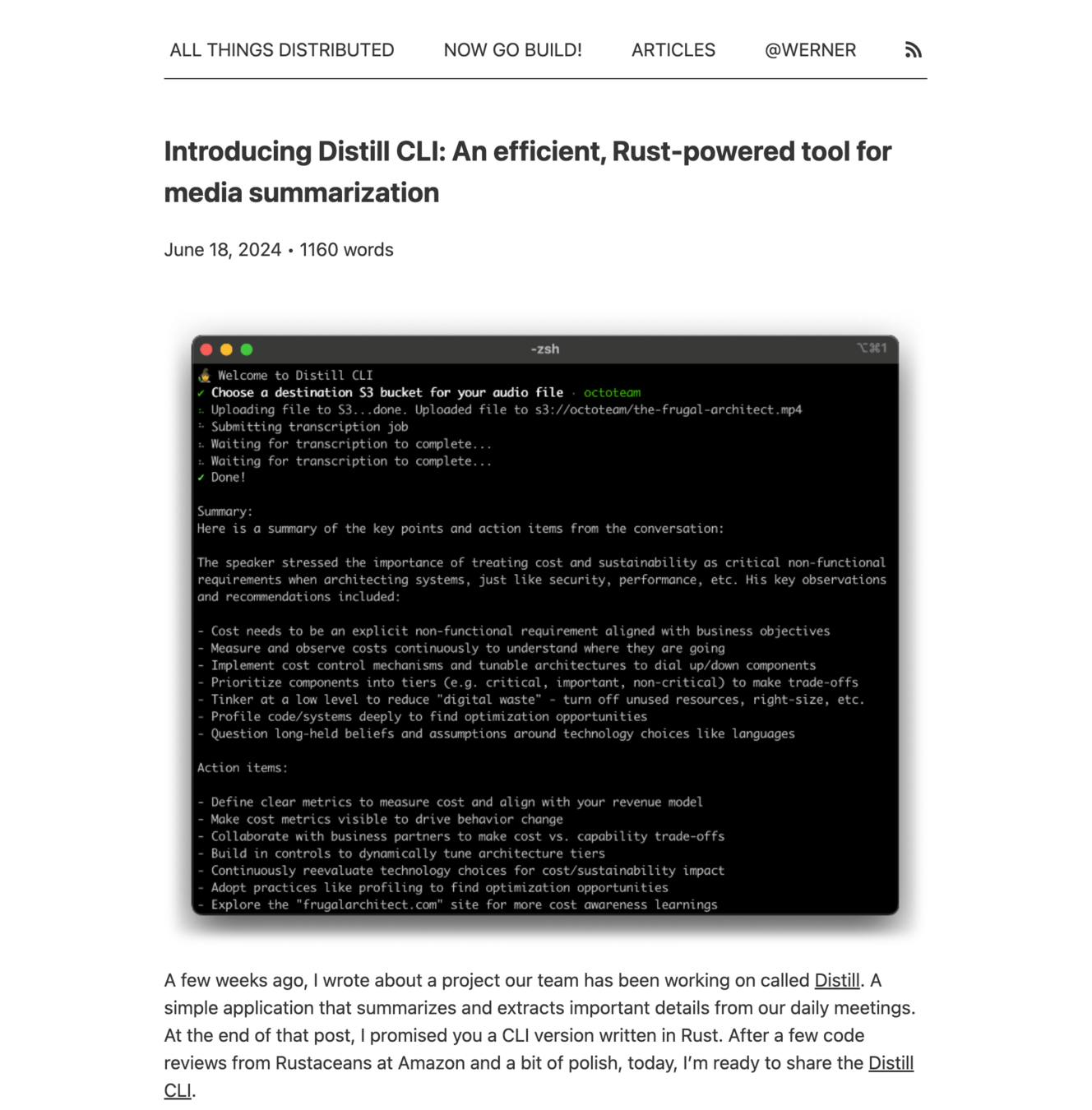
loige.co
😼 Repo
loige.co
💬 Shared Chat
Let's sink our teeth
into some rusty goodness!

loige.co
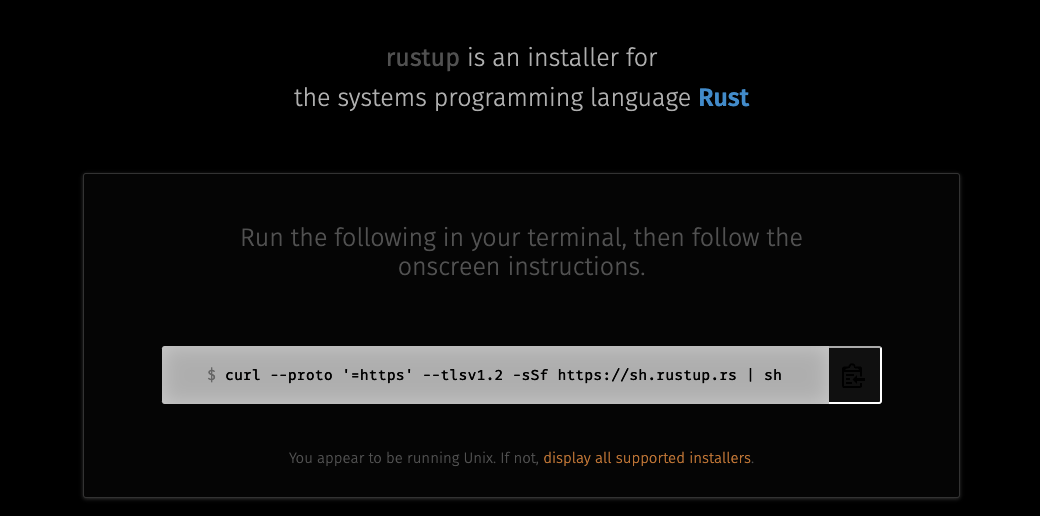

loige.co
cargo new hello-rustloige.co
cargo new hello-rust
cd hello-rustloige.co
cargo new hello-rust
cd hello-rust
cargo run
Hello, World!
loige.co
cargo new hello-rust
cd hello-rust
cargo run
Hello, World!
loige.co
Handling missing data & errors
loige.co
null... does not exist in Rust! 😵
loige.co
you can use () to represent no data
Unit type (empty tuple)
loige.co
fn some_function() {
// ... do something
}loige.co
fn some_function() -> () {
// ... do something
}Implicit
loige.co
But if you want to represent data that might be set or not, you should use Option
loige.co
fn main() {
let items: Vec<u32> = vec![];
let first_item = items.first();
}Option<u32>
Some(u32)
Presence of value
None
🥺 Absence of value
loige.co
fn main() {
let items: Vec<u32> = vec![];
let first_item = items.first(); // None
}loige.co
fn main() {
let items: Vec<u32> = vec![1,2,3];
let first_item = items.first(); // Some(1)
}loige.co
fn main() {
let items: Vec<u32> = vec![1, 2, 3];
let first_item = items.first();
match first_item {
Some(value) => println!("{}", value),
None => println!("No items"),
}
}😀 Happy path
🥺 Sad path
loige.co
fn main() {
let items: Vec<u32> = vec![1, 2, 3];
let first_item = items.first();
println!("{:?}", first_item.unwrap()); // 1
}
If you cannot get the value, panic!
loige.co
fn main() {
let items: Vec<u32> = vec![];
let first_item = items.first();
println!("{:?}", first_item.unwrap());
}
If you cannot get the value, panic!
thread 'main' panicked at examples/option-unwrap.rs:4:33: called `Option::unwrap()` on a `None` value note: run with `RUST_BACKTRACE=1` environment variable to display a backtrace
loige.co
fn main() {
let items: Vec<u32> = vec![];
let first_item = items.first();
println!("{:?}", first_item.expect("No first value"));
}If you cannot get the value, panic!
thread 'main' panicked at examples/option-expect.rs:4:33: No first value note: run with `RUST_BACKTRACE=1` environment variable to display a backtrace
loige.co
fn main() {
let items: Vec<u32> = vec![];
let first_item = items.first();
println!("{:?}", first_item.unwrap_or(&1)); // 1
}
if you cannot get the value, use a default value!
loige.co
use std::env;
fn main() {
let region = env::var("AWS_REGION");
}
Result<String, VarError>
😀 Happy path
🥺 Sad path
loige.co
use std::env;
fn main() {
let region = env::var("AWS_REGION");
match region {
Ok(region) => println!("Selected region: {}", region),
Err(_) => println!("Error: AWS_REGION not set"),
}
}
😀 Happy path
🥺 Sad path
loige.co
use std::env;
fn main() {
let region = env::var("AWS_REGION")
.expect("AWS_REGION environment variable not set");
}
StringIf you cannot get the value, panic!
loige.co
use std::env;
fn main() {
let region = env::var("AWS_REGION")
.unwrap_or_else(|_| "eu-west-1".to_string());
}
Rust makes it very hard for you to ignore possible errors or the absence of values.
if you cannot get the value, use a default value!
loige.co
🤑 FREE Resources for learning Rust
loige.co
- THE BOOK: rust-book.cs.brown.edu
- Rust by examples: doc.rust-lang.org/stable/rust-by-example
- Rust Design Patterns: rust-unofficial.github.io/patterns
- Exercism Rust track: exercism.org/tracks/rust
- Rustlings: github.com/rust-lang/rustlings
my favourite ones!
Why RUST + Lambda?


loige.co
Why Rust + Lambda
- Performance + Efficient memory-wise = COST SAVING 🤑
- Very fast cold starts! (proof) ⚡️
- Multi-thread safety 💪
- No null types + Great error primitives = fewer bugs 🐞



loige.co
Where do we start?

loige.co
Let's try to create a new function


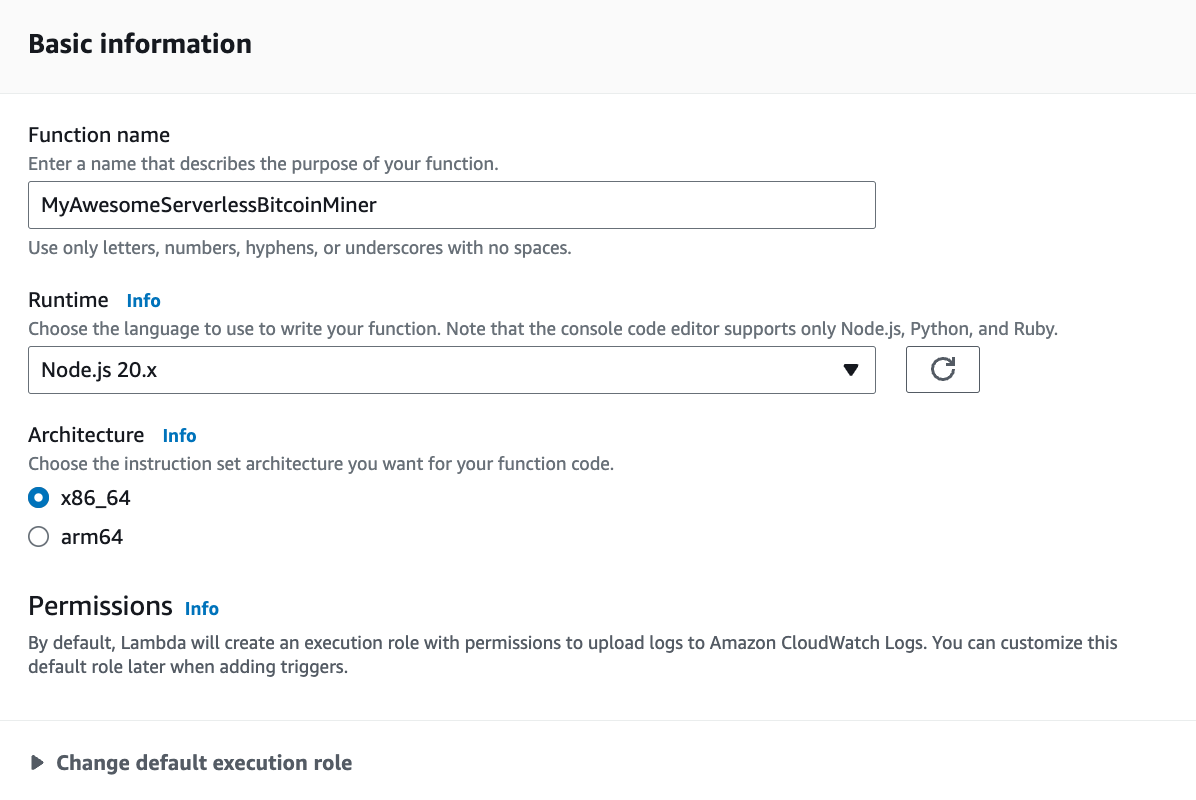
loige.co

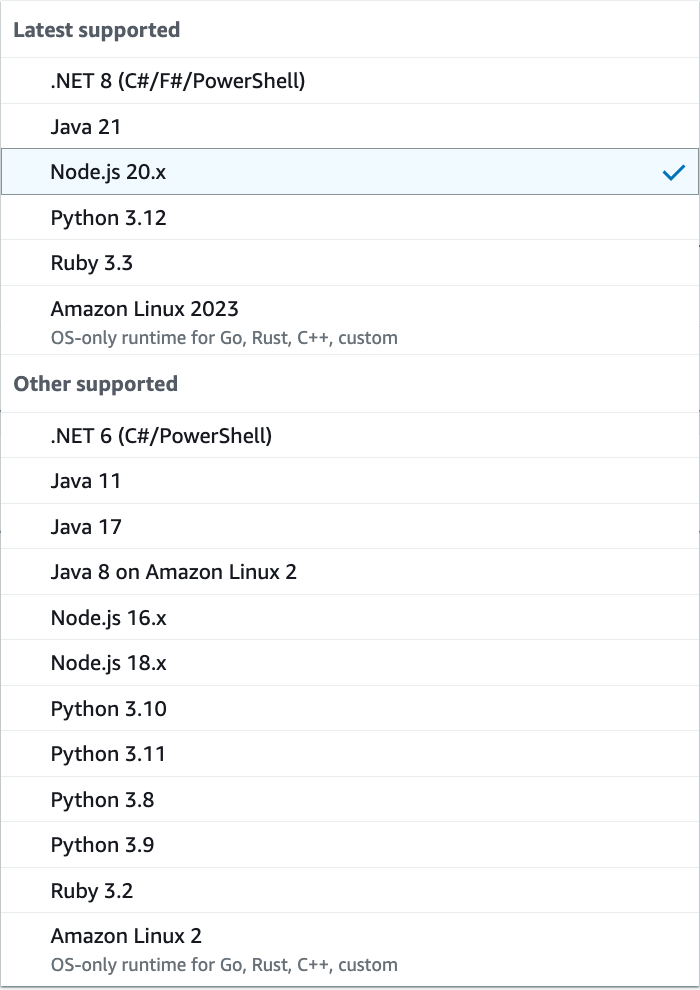


loige.co





RUST?!

loige.co





RUST?!

loige.co





EASY PEASY... we just need a custom runtime! 🤗

loige.co

loige.co
🏃♂️ Lambda execution model


loige.co
🏃♂️ Lambda execution model


Runtime
Handler (logic)
loige.co
🏃♂️ Lambda execution model


Runtime
Handler (logic)
Poll for events
loige.co
🏃♂️ Lambda execution model


Runtime
Handler (logic)
Poll for events
event (JSON)
loige.co
🏃♂️ Lambda execution model


Runtime
Handler (logic)
Poll for events
event (JSON)
execute
loige.co
🏃♂️ Lambda execution model


Runtime
Handler (logic)
Poll for events
event (JSON)
execute
response or
error
loige.co
🏃♂️ Lambda execution model


Runtime
Handler (logic)
Poll for events
event (JSON)
execute
response or
error
response (JSON)
or error

loige.co

loige.co
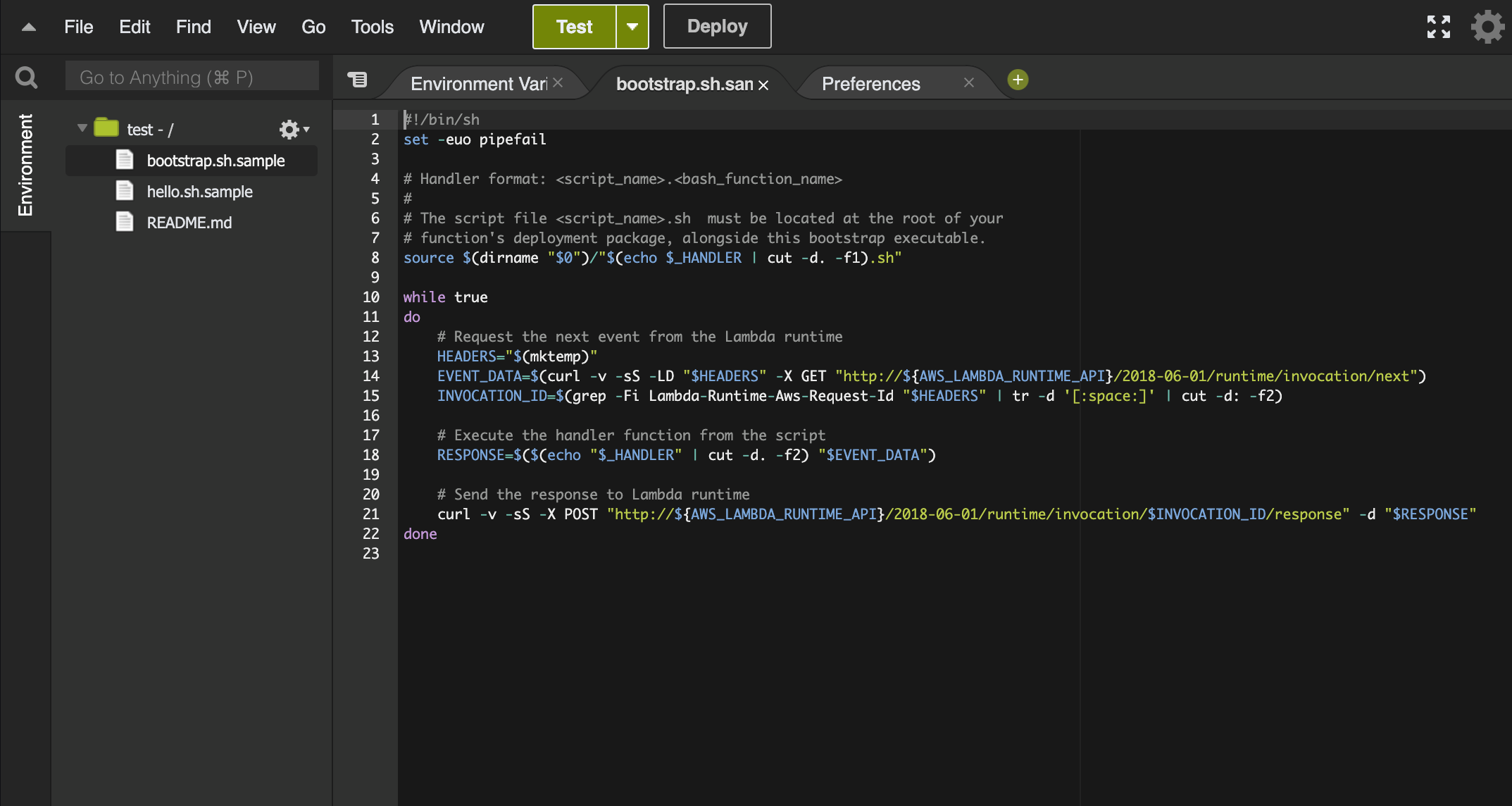
loige.co

Load the handler code
Infinite loop
loige.co

loige.co

loige.co
AWS made a Custom Rust Runtime for Lambda!

loige.co
Let's make it simple!
install cargo-lambda

loige.co

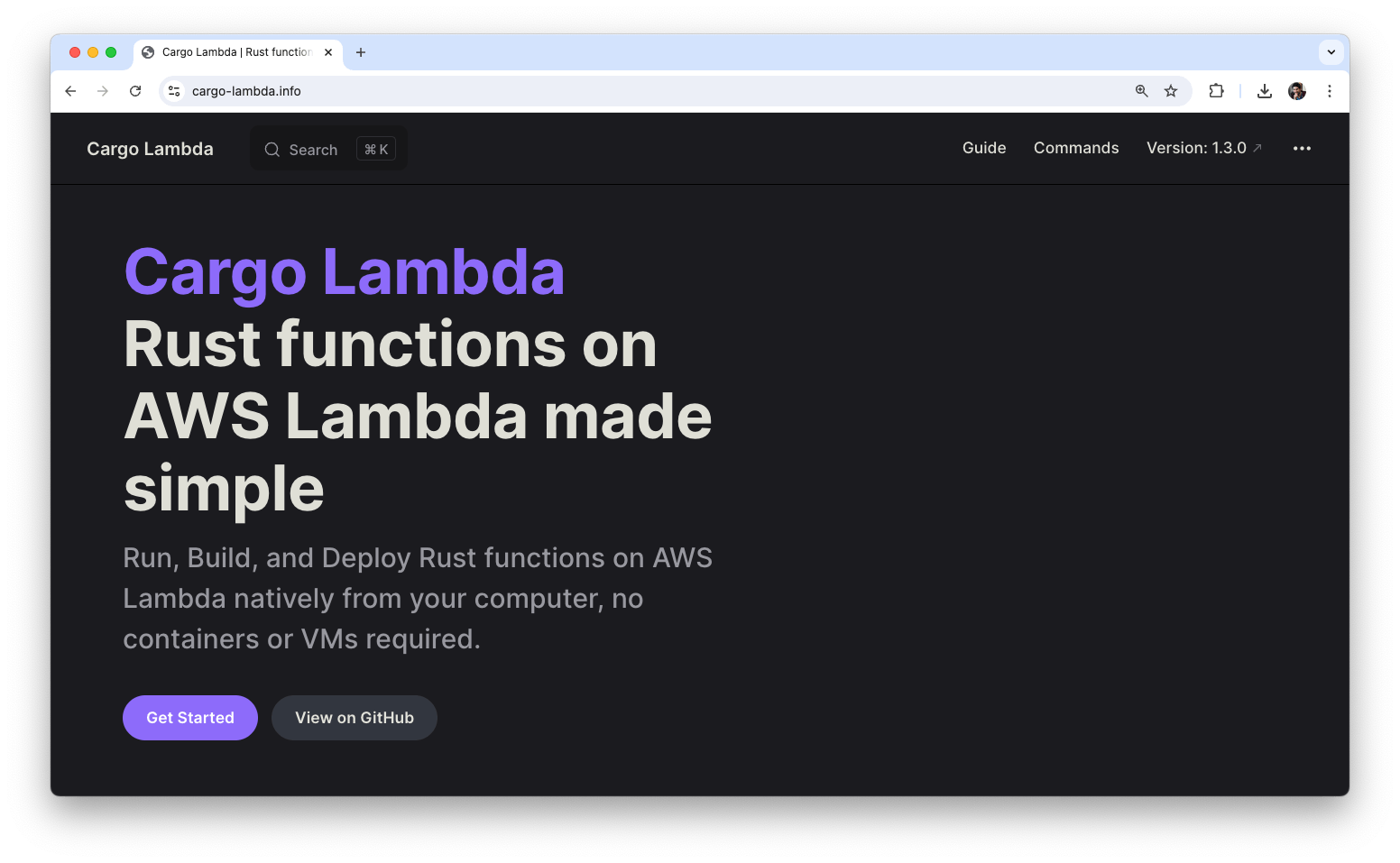
loige.co
cargo lambda new hello-lambdaloige.co
cargo lambda new hello-lambda
# Choose HTTP integration!loige.co

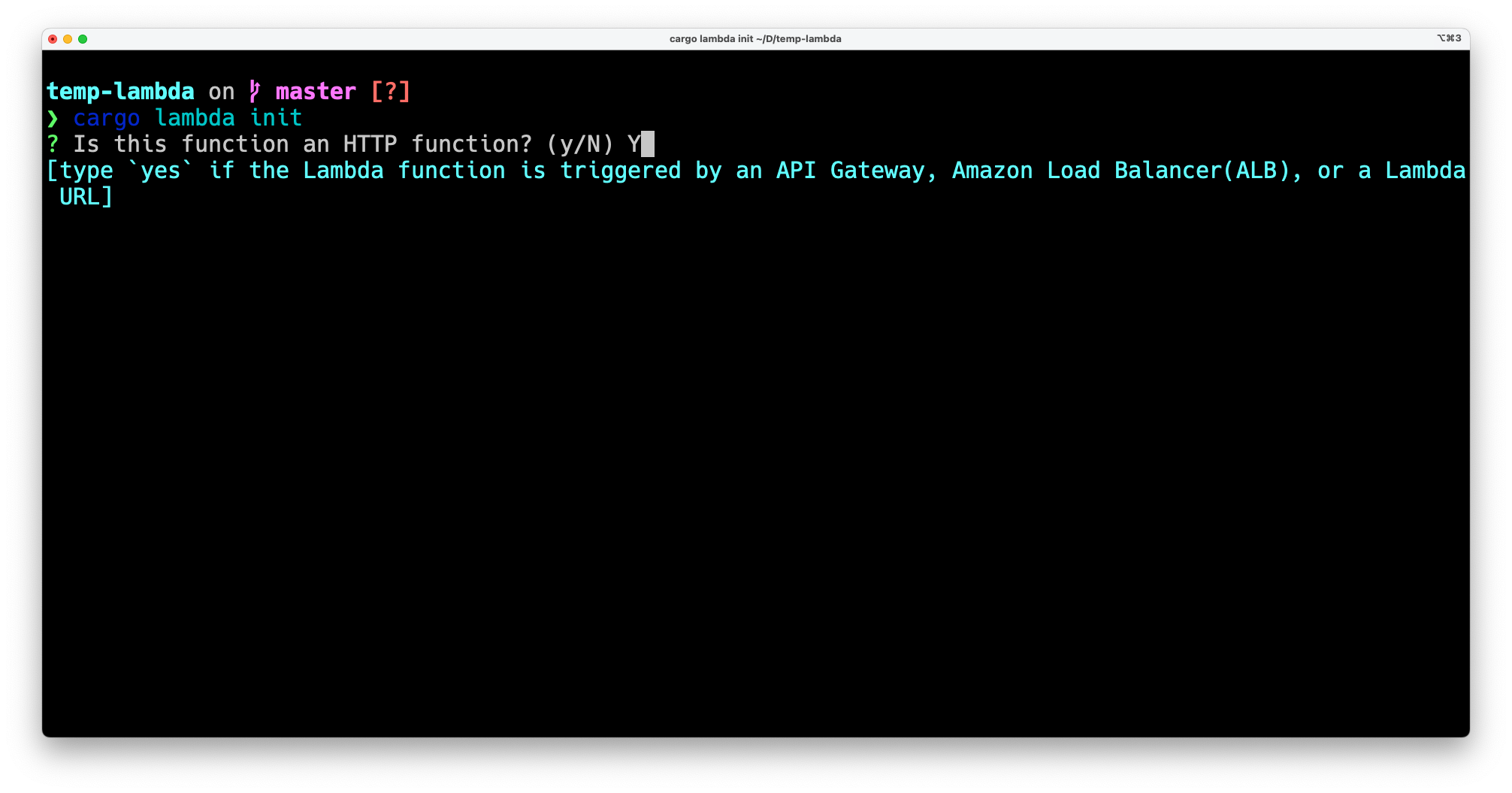
loige.co
use lambda_http::{run, service_fn, tracing, Body, Error, Request, RequestExt, Response};
#[tokio::main]
async fn main() -> Result<(), Error> {
tracing::init_default_subscriber();
run(service_fn(function_handler)).await
}
async fn function_handler(event: Request) -> Result<Response<Body>, Error> {
let who = event
.query_string_parameters_ref()
.and_then(|params| params.first("name"))
.unwrap_or("world");
let message = format!("Hello {who}, this is an AWS Lambda HTTP request");
let resp = Response::builder()
.status(200)
.header("content-type", "text/html")
.body(message.into())
.map_err(Box::new)?;
Ok(resp)
}loige.co
These are just abstractions! 🧐
Lambda is still using JSON behind the scenes.
For HTTP you generally use the Lambda-Proxy integration.
use lambda_http::{run, service_fn, tracing, Body, Error, Request, RequestExt, Response};
#[tokio::main]
async fn main() -> Result<(), Error> {
tracing::init_default_subscriber();
run(service_fn(function_handler)).await
}
async fn function_handler(event: Request) -> Result<Response<Body>, Error> {
let who = event
.query_string_parameters_ref()
.and_then(|params| params.first("name"))
.unwrap_or("world");
let message = format!("Hello {who}, this is an AWS Lambda HTTP request");
let resp = Response::builder()
.status(200)
.header("content-type", "text/html")
.body(message.into())
.map_err(Box::new)?;
Ok(resp)
}loige.co
Lambda-Proxy integration
Example Request (HTTP Event) 🧐
{
"resource": "/my/path",
"path": "/my/path",
"httpMethod": "GET",
"headers": {
"header1": "value1",
"header2": "value1,value2"
},
"multiValueHeaders": {
"header1": [
"value1"
],
"header2": [
"value1",
"value2"
]
},
"queryStringParameters": {
"parameter1": "value1,value2",
"parameter2": "value"
},
"multiValueQueryStringParameters": {
"parameter1": [
"value1",
"value2"
],
"parameter2": [
"value"
]
},
"requestContext": {
"accountId": "123456789012",
"apiId": "id",
"authorizer": {
"claims": null,
"scopes": null
},
"domainName": "id.execute-api.us-east-1.amazonaws.com",
"domainPrefix": "id",
"extendedRequestId": "request-id",
"httpMethod": "GET",
"identity": {
"accessKey": null,
"accountId": null,
"caller": null,
"cognitoAuthenticationProvider": null,
"cognitoAuthenticationType": null,
"cognitoIdentityId": null,
"cognitoIdentityPoolId": null,
"principalOrgId": null,
"sourceIp": "IP",
"user": null,
"userAgent": "user-agent",
"userArn": null,
"clientCert": {
"clientCertPem": "CERT_CONTENT",
"subjectDN": "www.example.com",
"issuerDN": "Example issuer",
"serialNumber": "a1:a1:a1:a1:a1:a1:a1:a1:a1:a1:a1:a1:a1:a1:a1:a1",
"validity": {
"notBefore": "May 28 12:30:02 2019 GMT",
"notAfter": "Aug 5 09:36:04 2021 GMT"
}
}
},
"path": "/my/path",
"protocol": "HTTP/1.1",
"requestId": "id=",
"requestTime": "04/Mar/2020:19:15:17 +0000",
"requestTimeEpoch": 1583349317135,
"resourceId": null,
"resourcePath": "/my/path",
"stage": "$default"
},
"pathParameters": null,
"stageVariables": null,
"body": "Hello from Lambda!",
"isBase64Encoded": false
}Lambda-Proxy integration
Example Response 🧐
{
"isBase64Encoded": false,
"statusCode": 200,
"headers": {
"Content-Type": "text/plain"
},
"body": "Hello, World"
}loige.co
Local Testing
loige.co

cargo lambda watchloige.co

cargo lambda invoke
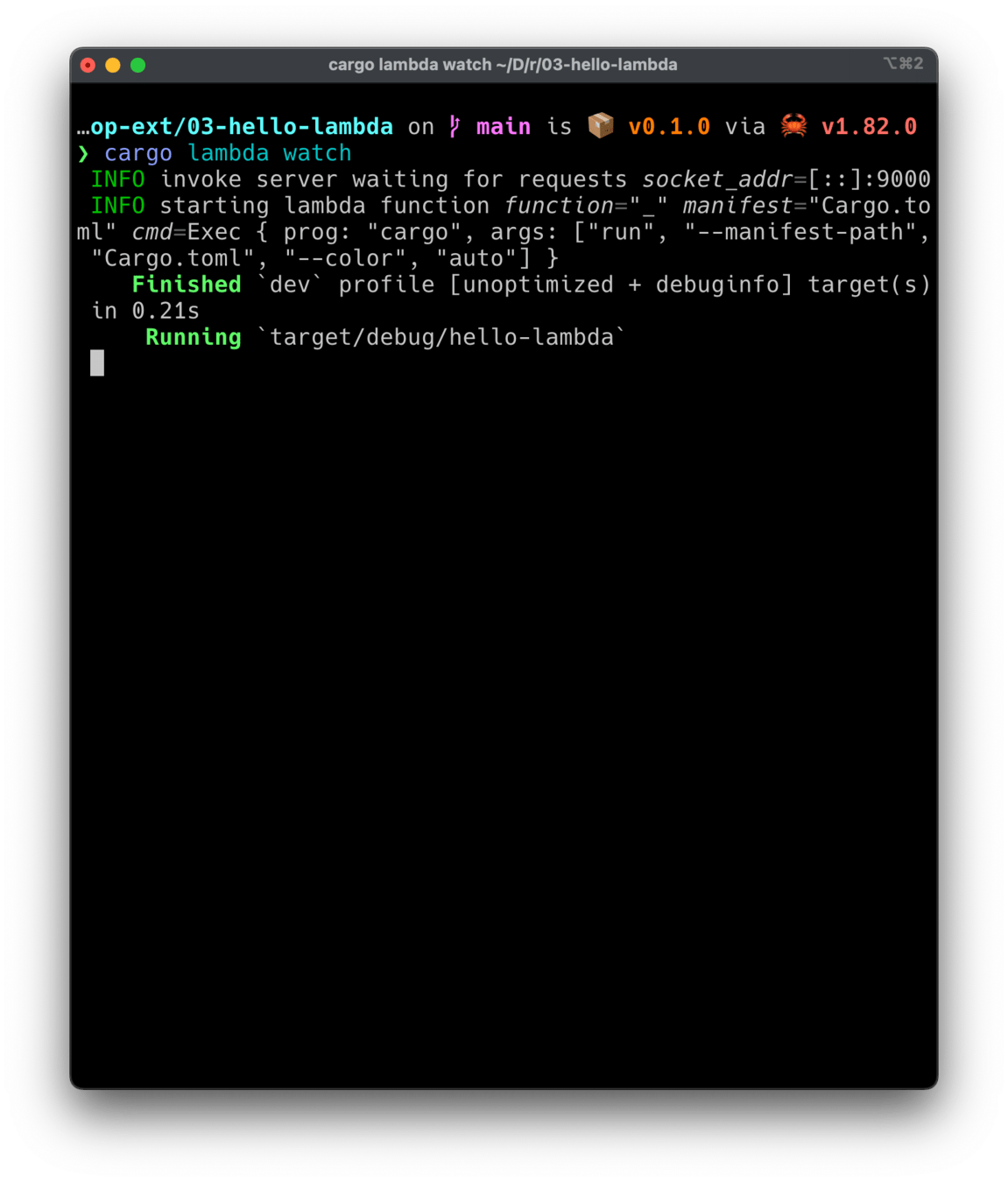
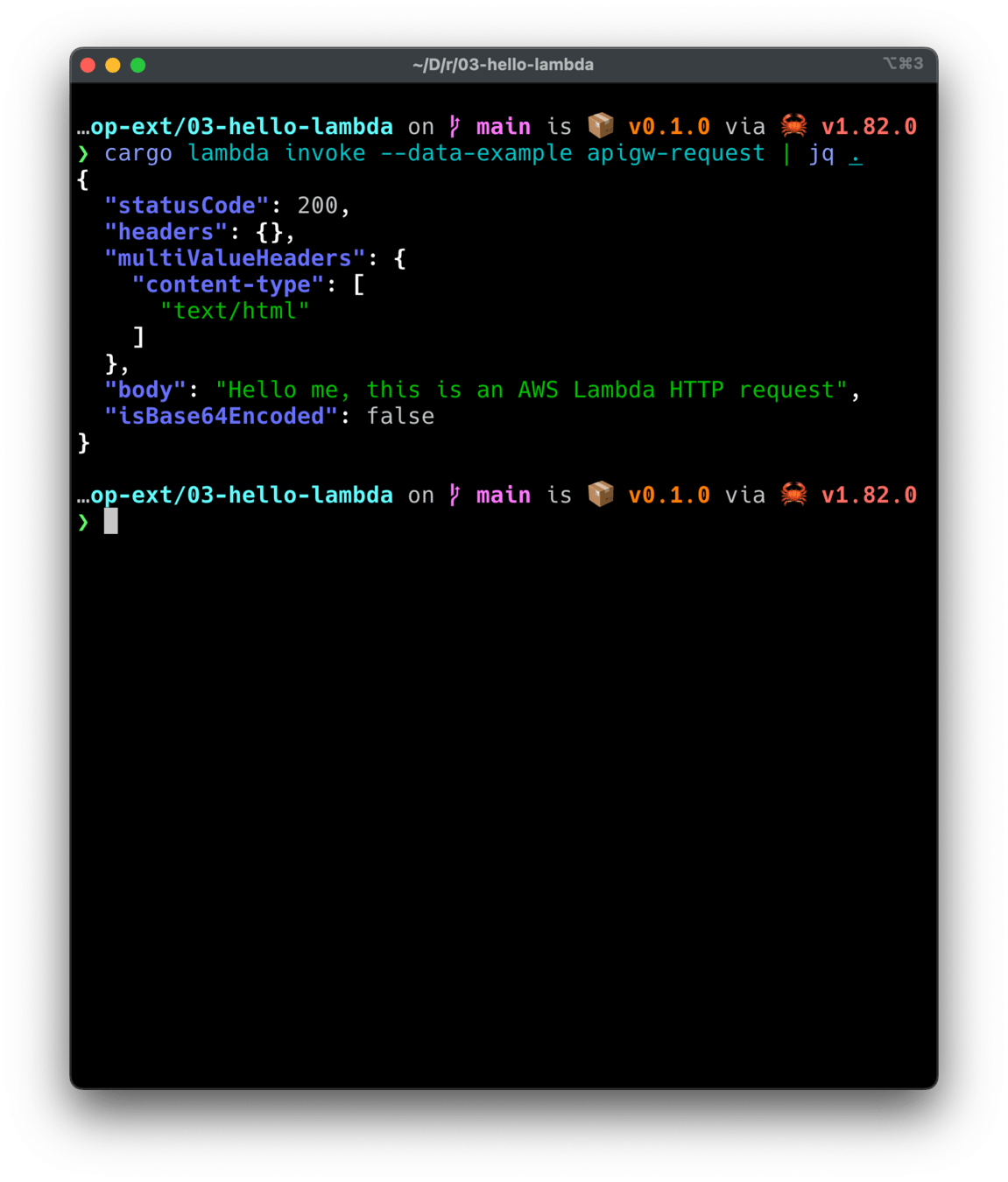
# 1. example event
# list of supported example events
# https://github.com/awslabs/aws-lambda-rust-runtime/tree/main/lambda-events/src/fixtures
cargo lambda invoke --data-example apigw-request
# 2. custom JSON event file
cargo lambda invoke --data-file event.json
# 3. inline
cargo lambda invoke --data-ascii '{"name": "Loige"}'loige.co
Building & Deploying
cargo lambda build --release --arm64 && cargo lambda deploy

loige.co
🔥 HOT TIP
cargo lambda deploy --enable-function-urlloige.co
✏️ Exercise #1
loige.co
The SCREAM endpoint!
Write a Lambda that implements an HTTP API that receives a message via query string parameters and responds with that messages capitalized (in the response body).
Bonus: if no message is provided in the request, return a help message in the response body.

GET https://...?message=Hello
HTTP/1.1 Content-Type: text/plain Content-Length: 5 HELLO
Different types of
events and responses

loige.co
async fn function_handler(event: LambdaEvent<EventType>)
-> Result<ResponseType, Error> {
let (event, context) = event.into_parts();
// ...
}
Request
Response
loige.co
Canonical Handler signature
async fn function_handler(event: LambdaEvent<EventType>)
-> Result<ResponseType, Error> {
let (event, context) = event.into_parts();
// ...
}
Generic Event Wrapper
Specific Response Type (Success)
loige.co
Canonical Handler signature
Specific Event Type
async fn function_handler(event: LambdaEvent<EventType>)
-> Result<ResponseType, Error> {
let (event, context) = event.into_parts();
// ...
}
Execution context
loige.co
Canonical Handler signature
Specific Event
(extracted)
use aws_lambda_events::event::s3::S3Event;
async fn function_handler(event: LambdaEvent<S3Event>)
-> Result<(), Error> {
let (event, context) = event.into_parts();
println!("{}", context.request_id);
for record in event.records {
tracing::info!(
"[{}] Bucket={} Key={}",
record.event_name.unwrap_or_default(),
record.s3.bucket.name.unwrap_or_default(),
record.s3.object.key.unwrap_or_default()
);
}
Ok(())
}loige.co
Specific Example (S3 event)
async fn function_handler(event: LambdaEvent<S3Event>)
-> Result<(), Error> {
// ...
Ok(())
}
Request
Response
What if we want to use different types? 🤨
loige.co
Option 1
use type definitions in the aws_lambda_events crate
loige.co
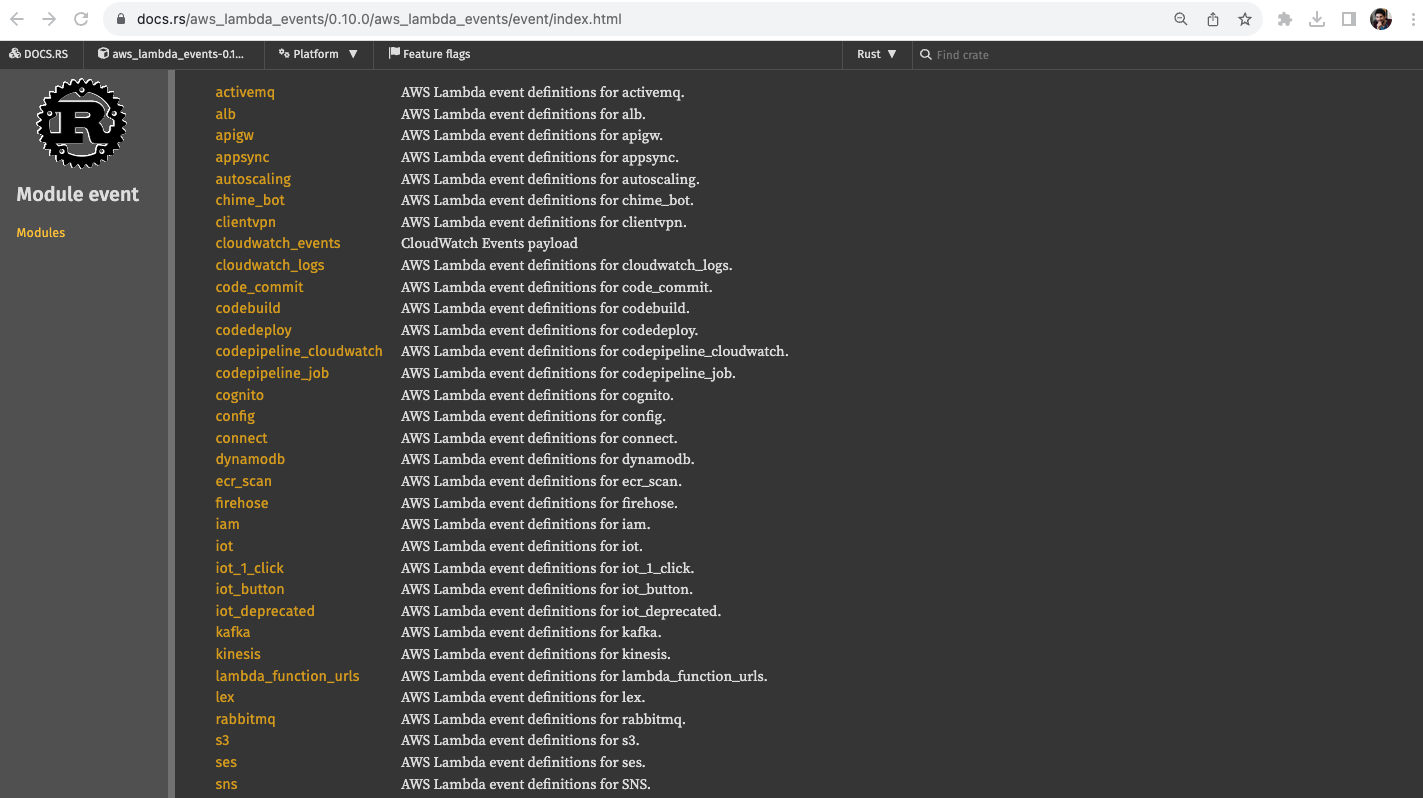
loige.co
Processing jobs from SQS
Example

Jobs



loige.co
# Cargo.toml
[dependencies]
aws_lambda_events = {
version = "0.15.0",
default-features = false,
features = [
"sqs",
]
}loige.co
use aws_lambda_events::event::sqs::{BatchItemFailure, SqsBatchResponse, SqsEvent};
// ...
async fn function_handler(event: LambdaEvent<SqsEvent>)
-> Result<SqsBatchResponse, Error> {
let mut failed_jobs = Vec::with_capacity(event.payload.records.len());
for record in event.payload.records {
// process the job
// ...
// if the job failed, add it to the failed_jobs list
failed_jobs.push(BatchItemFailure {
item_identifier: record.message_id.unwrap_or_default(),
});
}
Ok(SqsBatchResponse {
batch_item_failures: failed_jobs,
})
}
// ...loige.co
Option 2
Create custom request and response types
loige.co
Custom logic in Step Function
Example
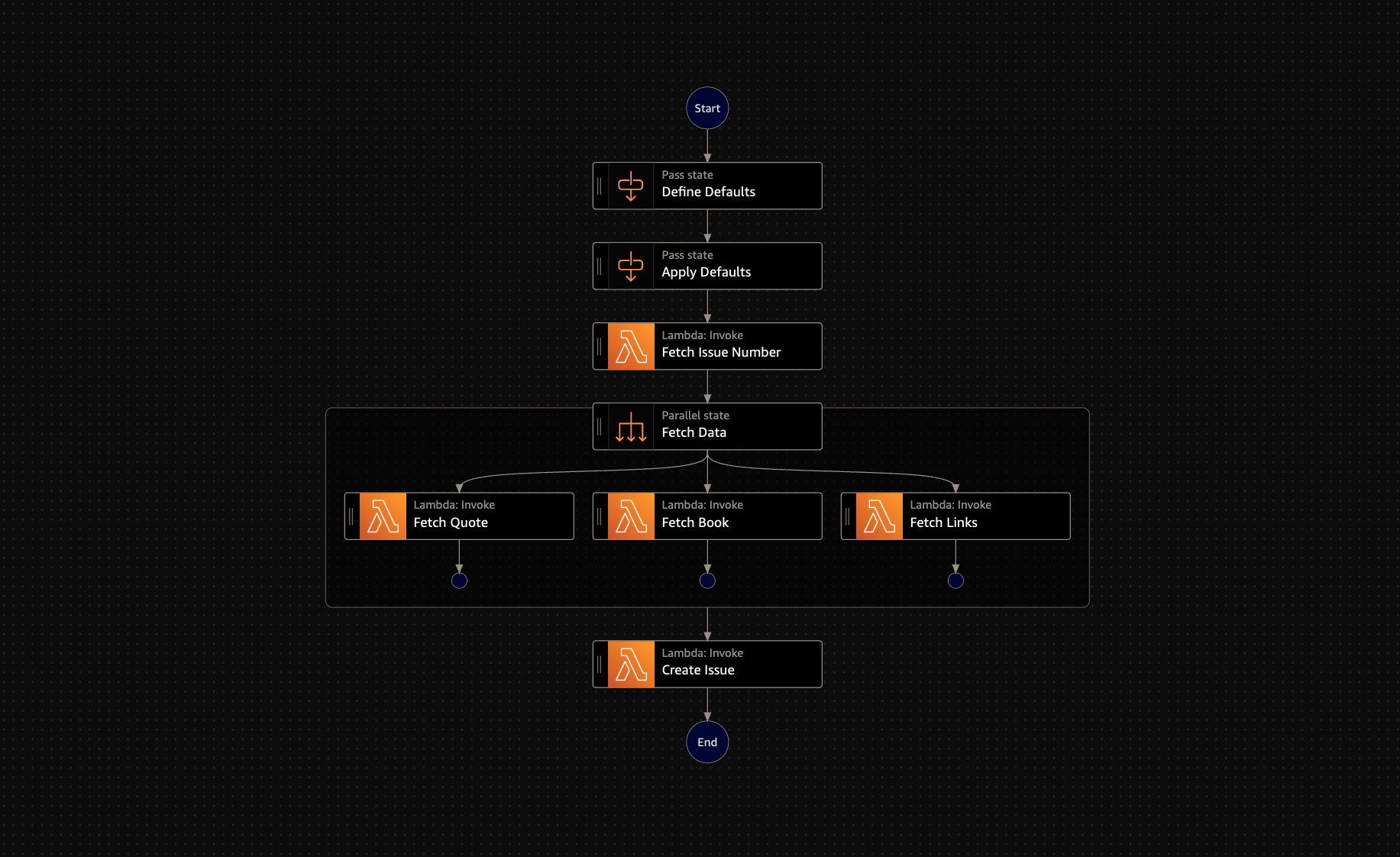
loige.co
# Cargo.toml
[dependencies]
serde = "1"
serde_json = "1"loige.co
// ...
#[derive(serde::Deserialize)]
struct Request {
url: String,
}
#[derive(serde::Serialize)]
struct Response {
issue_number: u32,
}
async fn function_handler(event: LambdaEvent<Request>)
-> Result<Response, Error> {
println!("I am going to scrape {}", event.payload.url);
// TODO: actual scraping logic here
Ok(Response { issue_number: 333 })
}
// ...loige.co
Option 3
Use arbitrary JSON values!
loige.co
// ...
async fn function_handler(
event: LambdaEvent<serde_json::Value>,
) -> Result<serde_json::Value, Error> {
let url = event
.payload
.as_object()
.unwrap()
.get("url")
.unwrap()
.as_str()
.unwrap(); // 🤮
println!("I am going to scrape {}", url);
// TODO: actual scraping logic here
Ok(serde_json::json!({ "issue_number": 333 }))
}
// ...loige.co
✏️ Exercise #2
loige.co
S3 processing
Write a Lambda that processes S3 events. For every object in the event, print the bucket name, the type of operation, and the object name.
S3 Event

MyBucket - ObjectCreated:Put "Happy Face.jpg"
LOGS
MyBucket - ObjectCreated:Put "lolz.gif"
MyBucket - ObjectCreated:Put "secrets/passwords.txt"
loige.co
Problems with the current deployment approach...

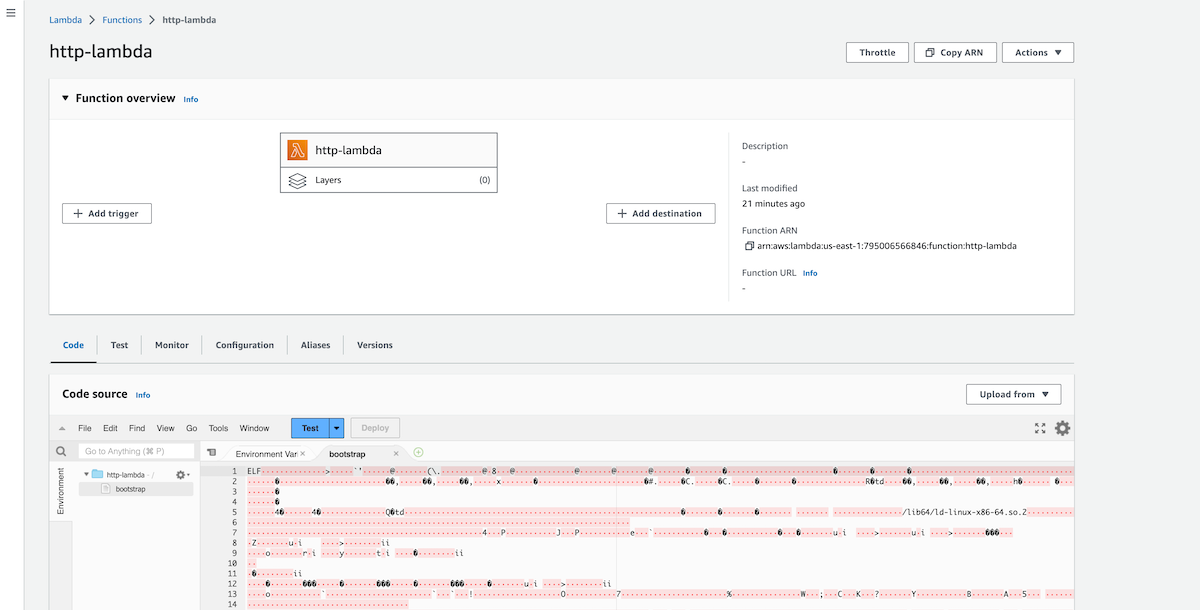
NO TRIGGER CONFIGURED! 🙄
WUT!? 😱
loige.co
... more problems

- Configuring our Lambda Function (Memory, timeout, environment variables, permissions, etc.)
- Creating various resources for our app (S3 buckets, SQS queues, etc.)
- Wiring different resources together (e.g. pass a DynamoDB table name to a Lambda function)
- A few resources are created (Log Groups, Roles, Lambdas) that you will need to clean up manually if you need to delete the application.
SAM
Serverless Application Model

IaC with...
loige.co
What is SAM?
- A tool that allows you to do IaC (Infrastructure as Code)
- You can define all your infrastructure in a declarative configuration file (YAML or JSON)
- SAM will read that file and deploy everything consistently
- SAM is based on CloudFormation but it offers a more concise syntax for common serverless use cases
loige.co
SAM speed run 🏃
- File structure (header, parameters, resources, outputs)
- References
- Functions
loige.co
File structure
loige.co
# template.yaml
Transform: AWS::Serverless-2016-10-31
Globals:
Function:
Runtime: nodejs22.x
Timeout: 180
Description: "This is a cool serverless project"
Parameters:
ParameterLogicalID:
Description: Information about the parameter
Type: String
Default: somevalue
AllowedValues:
- value1
- value2
Resources:
HelloWorldFunction:
Type: AWS::Serverless::Function
Properties:
Environment:
Variables:
MESSAGE: "Hello From SAM"
Outputs:
OutputLogicalID:
Description: Information about the value
Value: Value to return
Export:
Name: Name of resource to exportDefine a Lambda function
loige.co
Transform: AWS::Serverless-2016-10-31
Resources:
ExampleHttpLambda:
Type: AWS::Serverless::Function
Metadata:
BuildMethod: rust-cargolambda
Properties:
CodeUri: .
Handler: bootstrap
Runtime: provided.al2023
Architectures:
- arm64
Environment:
Variables:
SOME_VARIABLE: SomeValue
Events:
HttpPost:
Type: Api
Properties:
Path: /
Method: get
Define an S3 Bucket
loige.co
Transform: AWS::Serverless-2016-10-31
Resources:
MyLovelyBucket:
Type: AWS::S3::Bucket
Properties:
BucketName: MyUniqueNameForMyBucket
PublicAccessBlockConfiguration:
BlockPublicAcls: true
BlockPublicPolicy: true
IgnorePublicAcls: true
RestrictPublicBuckets: true
BucketEncryption:
ServerSideEncryptionConfiguration:
- ServerSideEncryptionByDefault:
SSEAlgorithm: aws:kmsDefine a DynamoDB Table
loige.co
Transform: AWS::Serverless-2016-10-31
Resources:
HealthChecksTable:
Type: AWS::DynamoDB::Table
Properties:
BillingMode: PAY_PER_REQUEST
KeySchema:
- AttributeName: "Id"
KeyType: "HASH"
- AttributeName: "Timestamp"
KeyType: "RANGE"
AttributeDefinitions:
- AttributeName: "Id"
AttributeType: "S"
- AttributeName: "Timestamp"
AttributeType: "S"loige.co
Transform: AWS::Serverless-2016-10-31
Parameters:
SomeParameter:
Description: Information about the parameter
Type: String
Resources:
HelloWorldFunction:
Type: AWS::Serverless::Function
Properties:
Environment:
Variables:
MESSAGE: !Ref SomeParameter
BUCKET_ARN: !GetAtt MyBucket.Arn
MyBucket:
Type: AWS::S3::Bucketloige.co
Transform: AWS::Serverless-2016-10-31
Parameters:
AppId:
Type: String
Description: A unique name for the deployment
Resources:
TinykitBucket:
Type: AWS::S3::Bucket
Properties:
BucketName: !Sub tinykit-${AppId}
AnotherBucket:
Type: AWS:S3:Bucket
Properties:
BucketName: !Join ["-", ["my", !Ref AppId, "bucket"]]
# my-${AppId}-bucketLambda Permissions
loige.co
Transform: AWS::Serverless-2016-10-31
Resources:
CampaignsTable:
Type: AWS::DynamoDB::Table
Properties:
# ...
FormRenderingFunction:
Type: AWS::Serverless::Function
Metadata:
BuildMethod: rust-cargolambda
Properties:
# ...
Policies:
- DynamoDBReadPolicy:
TableName: !Ref CampaignsTable🔥 HOT TIP AWS extension for VSCode
loige.co
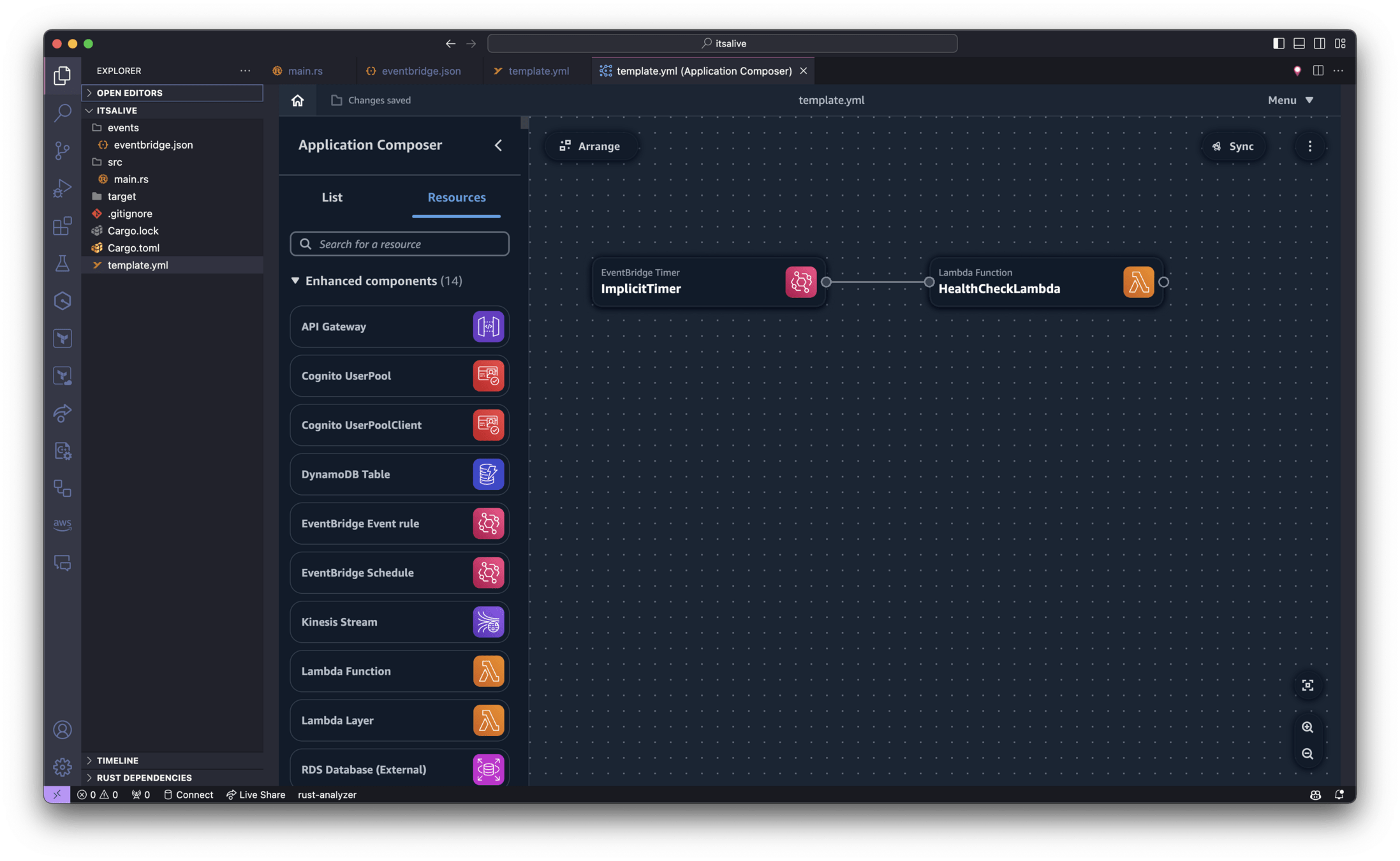
AWS SAM + Cargo Lambda
SAM Works with Cargo Lambda (beta feature):
- Define IaC with the full power of SAM
- Build and run your Rust lambdas with Cargo Lambda
- Can simulate API Gateway locally!
Note: Cargo Lambda also works with CDK
(github.com/cargo-lambda/cargo-lambda-cdk)
loige.co
# template.yaml
AWSTemplateFormatVersion: "2010-09-09"
Transform:
- AWS::Serverless-2016-10-31
Resources:
ExampleHttpLambda:
Type: AWS::Serverless::Function
Metadata:
BuildMethod: rust-cargolambda
Properties:
CodeUri: .
Handler: bootstrap
Runtime: provided.al2023
Architectures:
- arm64
Events:
HttpPost:
Type: Api
Properties:
Path: /
Method: get# samconfig.toml
version = 0.1
[default]
[default.global]
[default.global.parameters]
stack_name = "rust-http-lambda"
[default.build.parameters]
beta_features = true
[default.sync.parameters]
beta_features = trueTells SAM to build using Cargo Lambda
Selects a "custom runtime"
Enables SAM beta features
loige.co
Building, Local testing & Deploying
sam build sam local start-api sam deploy

loige.co
🔥 HOT (annoying) TIP
sam validate --lint && sam build --beta-features && sam deployloige.co
You always need to build before deploying
(if you changed something)

loige.co
Passing configuration to the handler

loige.co
-
You should load the configuration and initialize clients in the init phase
- Then, you can pass those to the handler
- This way you are doing the heavy work only once (per lambda instance)
- To support this pattern, we need to make our handler "configurable" (i.e. it should receive a config value at every invocation)
🔥 Performance HOT TIP
"init once, reuse many"
loige.co
struct HandlerConfig {
table_arn: String
}
async fn function_handler(
config: &HandlerConfig, // <- now we can receive a reference to the config
_event: LambdaEvent<EventBridgeEvent<Value>>,
) -> Result<(), Error> {
// ...
}
#[tokio::main]
async fn main() -> Result<(), Error> {
let table_arn = env::var("TABLE_ARN")
.expect("TABLE_ARN environment variable is not set");
let config = &HandlerConfig {
table_arn,
};
run(service_fn(move |event| async move {
function_handler(config, event).await
}))
.await
}✏️ Exercise #3
loige.co
S3 processing with SAM
Let's update our previous exercise (process files from S3) and let's use SAM.
Use a SAM template to define the S3 bucket and the Lambda function. Pass the bucket name to the lambda function using an environment variable.
Note: Be careful with circular dependencies in your template 🥵
Using the AWS SDK for Rust!
loige.co

loige.co
cargo add aws-config aws-sdk-dynamodbList of available libraries
You will always need the aws-config crate (credentials and config management)
You will need to install the specific client library for the services you want to us
loige.co
let table_name = env::var("TABLE_NAME").expect("TABLE_NAME not set");
let config = aws_config::defaults(BehaviorVersion::latest())
.load()
.await;
let dynamodb_client = aws_sdk_dynamodb::Client::new(&config);
let timestamp = event
.payload
.time
.unwrap()
.format("%+")
.to_string();
let mut item = HashMap::new();
item.insert(
"Id".to_string(),
AttributeValue::S(format!("https://loige.co#{}", timestamp)),
);
item.insert("Timestamp".to_string(), AttributeValue::S(timestamp));
let insert_result = dynamodb_client
.put_item()
.table_name(table_name.as_str())
.set_item(Some(item))
.send()
.await?;
tracing::info!("Insert result: {:?}", insert_result);✏️ Exercise #4
loige.co
S3 image resizing
Let's update our previous exercise (process files from S3) and let's resize image files.
You have to:
- Check if the file is an image (you can match on the extension)
- Read the content of the file using the S3 SDK
- Load the image in memory and resize it (image crate)
- Save the resulting image to S3 using the S3 SDK (examples)
Note: remember to give your Lambda permissions to read and write to the S3 bucket!
Note: Try to create the S3 client on the init phase and pass it as configuration!
✏️ Exercise #4
loige.co
S3 image resizing
🔥 SUPER IMPORTANT: Be careful with circular invocation loops!
If you save the generated image in the same bucket, you might trigger the lambda again!

🌠

🌠
🌠
✏️ Exercise #4
loige.co
S3 image resizing
🔥 SUPER IMPORTANT: Be careful with circular invocation loops!
Possible solutions:
- Use different buckets (source images, generated images)
- Use different object prefixes and trigger the Lambda only on specific prefixes (e.g. /uploads/ vs /thumbnails/)
✏️ Final project
Website Health-check App
loige.co

Trigger a Lambda
on a schedule
loige.co
Transform: AWS::Serverless-2016-10-31
Resources:
HealthCheckLambda:
Type: AWS::Serverless::Function
Properties:
# ...
Events:
ScheduledExecution:
Type: Schedule
Properties:
Schedule: rate(30 minutes)
Enabled: false# Cargo.toml
[dependencies]
reqwest = {
version = "0.12.4",
default-features = false,
features = [
"json",
"rustls-tls",
"http2",
]
}loige.co
Making HTTP Requests
let client = reqwest::Client::builder()
.timeout(Duration::from_secs(10))
.build()?;
let resp = client
.get("https://loige.co")
.send()
.await
.expect("Failed to send request");
dbg!(resp.status().is_success());
dbg!(resp.status().as_u16());
let content = resp
.text()
.await
.expect("Failed to read response body");loige.co
Making HTTP Requests
Step By Step Solution
loige.co
Closing notes
- Lambda is great (but you knew that already 😉)
- Writing Lambdas in Rust is fun and it can be very cost-efficient
- Still not very common to write Lambdas in Rust, but the tooling and the DX is already quite good (Cargo Lambda + SAM / CDK)
- Go, have fun, share your learnings!



loige.co
BONUS: SAM + Cargo Lambda
a complete example
loige.co
BONUS 2: another complete example
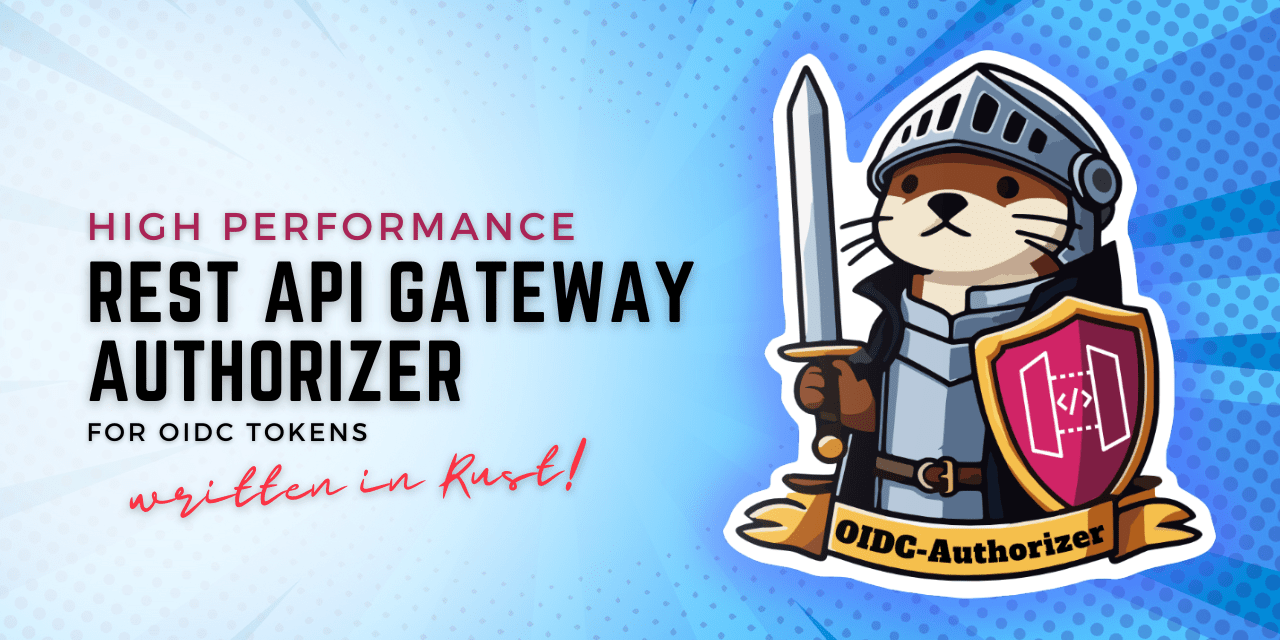
loige.co
Thanks to @gbinside, @conzy_m, @eoins, and @micktwomey for kindly reviewing this talk!
THANKS!
Grab these slides!




loige.co


